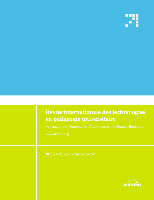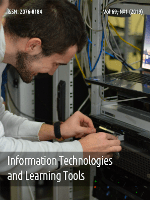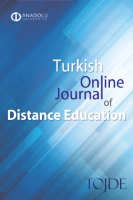
International Journal of Technologies in Higher Education
Scope & Guideline
Pioneering Research for Tomorrow's Educational Practices
Introduction
Aims and Scopes
- Integration of Technology in Pedagogy:
The journal emphasizes studies that investigate how various technologies can be integrated into teaching practices to improve educational outcomes, including blended learning environments and digital tools. - Impact of Digital Learning on Student Engagement:
Research that focuses on understanding how digital learning environments affect student engagement, motivation, and satisfaction is a core area of interest, particularly in the context of distance education. - Educational Innovation and Curriculum Development:
The journal promotes innovative educational practices and curriculum development that leverage technology, including adaptive learning systems and gamification strategies. - Assessment and Evaluation in Digital Contexts:
Contributions that analyze assessment methodologies in digital learning environments, including the effectiveness of online assessments and feedback mechanisms, are highlighted. - Health and Wellbeing in Education:
Exploring the intersection of mental health, wellbeing, and educational practices, particularly in the context of the challenges posed by the COVID-19 pandemic, forms an essential focus area.
Trending and Emerging
- Adaptive Learning Technologies:
There is a rising interest in adaptive learning platforms that personalize education based on individual learner needs, showcasing the potential for improved student outcomes through tailored learning experiences. - Impact of COVID-19 on Educational Practices:
The pandemic has catalyzed extensive research on the implications of emergency remote teaching, with a focus on lessons learned and future directions for resilient educational practices. - Mental Health and Wellbeing in Education:
The integration of mental health considerations into educational frameworks is gaining traction, as institutions seek to address the psychological impacts of digital learning environments on students. - Simulation and Virtual Learning Environments:
The use of simulations and virtual environments for teaching complex subjects is emerging as a significant trend, particularly in professional education fields such as nursing and medical training. - Gamification and Engagement Strategies:
Research on gamification techniques and their effectiveness in enhancing student engagement and learning outcomes is increasingly prevalent, reflecting a shift towards more interactive and enjoyable learning experiences.
Declining or Waning
- Traditional Face-to-Face Teaching Methods:
There is a noticeable decrease in research focusing on traditional face-to-face teaching methods, as the shift towards hybrid and fully online learning environments becomes more prevalent. - General Use of Social Media in Education:
While social media's role in education was once a hot topic, recent publications suggest a waning interest in generic studies about social media use, with more focus now on specific applications and their educational impacts. - Static Learning Environments:
Research on static, non-interactive learning environments is declining, as the emphasis on dynamic, interactive, and student-centered learning experiences grows. - Overarching Theories of Learning without Technological Context:
There seems to be a reduction in papers discussing broad theories of learning that do not take into account the technological context, as the journal increasingly focuses on technology-enhanced learning. - Non-Digital Assessment Methods:
Interest in traditional assessment methods that do not incorporate technology is decreasing, reflecting a shift towards evaluating digital assessment strategies in higher education.
Similar Journals

Information Technologies and Learning Tools
Leading the Charge in Digital Learning Innovations.Information Technologies and Learning Tools is a pioneering scholarly journal dedicated to the exploration and dissemination of knowledge within the rapidly evolving field of educational technology. Published by the NATIONAL ACADEMY OF EDUCATIONAL SCIENCES OF UKRAINE, INSTITUTE OF DIGITALIZATION EDUCATION, this journal has maintained its Open Access policy since 2006, ensuring that groundbreaking research is readily available to educators, researchers, and practitioners worldwide. With the ISSN 2076-8184, the journal serves as a critical platform for innovative studies focusing on the integration of information technologies into educational practices, seeking to bridge gaps between digital tools and effective learning methodologies. Despite the absence of specific rankings, its commitment to advancing educational theories and applications positions it as an essential resource for professionals and students striving to enhance learning experiences through technology. As the educational landscape continues to transform, Information Technologies and Learning Tools stands at the forefront, fostering collaboration and knowledge sharing across diverse academic communities.

International Journal of Technology in Education
Exploring the Future of Learning and TechnologyThe International Journal of Technology in Education, published by the International Society for Technology Education & Science (ISTES), serves as a vital platform for researchers, educators, and practitioners devoted to the intersection of technology and educational practices. With an E-ISSN of 2689-2758, this journal aims to showcase innovative research, case studies, and theoretical contributions that explore how emerging technologies can enhance teaching and learning. Although specific metrics like impact factor and HIndex are currently unavailable, the journal is committed to rigorous peer review and high academic standards, ensuring that all published work contributes meaningfully to the evolving landscape of educational technology. As an open-access journal, it strives to make research widely available, fostering collaboration and knowledge sharing among its audience. Whether you are a researcher exploring new horizons or a professional seeking practical applications of technology in education, the International Journal of Technology in Education is an indispensable resource.

Turkish Online Journal of Distance Education
Transforming Challenges into Opportunities in Distance Education.Turkish Online Journal of Distance Education, a distinguished publication from ANADOLU UNIVERSITY, serves as a vital resource in the field of distance education, contributing significantly to the ongoing discourse since its inception in 2000. With an impressive impact factor that reflects its standing within the academic community, this open access journal provides an influential platform for researchers, educators, and practitioners to disseminate innovative findings and educational strategies. Ranked in the Q2 category within the education sector according to the 2023 quartile rankings, and boasting a commendable position of #423 out of 1543 in Scopus' Social Sciences Education rankings, the journal places itself firmly within the 72nd percentile of its cohort. Spanning from 2004 to 2024, the journal's commitment to advancing scholarship in distance education is reflected not only in its comprehensive articles but also in its responsive engagement with contemporary educational challenges. Positioned in Eskişehir, Turkey, this journal aims to elevate discussions surrounding online learning and contributes to the global dialogue on education accessibility and innovation.

Learning and Teaching in Higher Education-Gulf Perspectives
Transforming Higher Education Through Open Access KnowledgeLearning and Teaching in Higher Education - Gulf Perspectives is a premier Open Access journal published by Emerald Group Publishing Ltd, dedicated to advancing knowledge in the field of education, particularly within the context of higher education in the Gulf region. Since its inception in 2004, the journal has provided a vital platform for scholarly discourse, catering to an audience that includes researchers, educators, and policymakers. With an impressive Scopus ranking, placing it in the top 30% of education journals, and a Q3 quartile classification, it consistently publishes rigorous research and innovative practices that aim to influence educational strategies and contribute to the quality of higher education. The journal supports Open Access, ensuring that research findings are readily available to the wider academic community and the public, thereby fostering informed dialogue and collaboration across disciplines. By bridging local educational insights with global trends, Learning and Teaching in Higher Education - Gulf Perspectives stands as a crucial resource for those committed to improving educational outcomes in the region and beyond.

International Journal of Educational Management
Exploring New Frontiers in Educational ManagementInternational Journal of Educational Management, published by Emerald Group Publishing Ltd., stands as a premier platform for the dissemination of research in the fields of education and organizational behavior. With an ISSN of 0951-354X and an E-ISSN of 1758-6518, this journal has been at the forefront of academic inquiry since its inception in 1987 and continues to thrive with converged publication years extending to 2024. The journal is ranked in the Q2 quartile for both Education and Organizational Behavior and Human Resource Management as of 2023, highlighting its significant impact within these domains. Notably, its Scopus ranking places it within the top 20% of journals in Social Sciences - Education and the top 38% in Business Management and Accounting. With access options currently set to non-open access, the journal serves as a crucial resource for academicians, practitioners, and students seeking to enhance their understanding of effective educational management and its strategic implications. The commitment to advancing knowledge and practice makes the International Journal of Educational Management an essential citation for those dedicated to fostering excellence in educational environments.

Innovacion Educativa-Mexico
Fostering collaboration for a brighter educational future.Innovacion Educativa-Mexico is a premier academic journal dedicated to advancing the field of educational innovation, with a strong emphasis on practices and research that enhance learning outcomes in Mexico and beyond. Published by the Instituto Politécnico Nacional (IPN), this journal plays a crucial role in disseminating original research, case studies, and theoretical discussions that address contemporary challenges in education. With its ISSN 1665-2673 and E-ISSN 2594-0392, Innovacion Educativa-Mexico provides a valuable platform for scholars, educators, and practitioners to share their insights and foster collaboration aimed at improving educational systems. While it currently operates under a traditional access model, the journal’s commitment to quality and relevance is reflected in its ongoing efforts to maintain high academic standards. Residing at the heart of Mexico City, the journal is strategically positioned to address local educational challenges while contributing to the global dialogue on innovative pedagogical practices.

Technology Knowledge and Learning
Fostering Excellence in Computational and Educational ResearchTechnology Knowledge and Learning, published by SPRINGER, stands as a pivotal platform in the realms of computational theory, computer science, education, and human-computer interaction. With an impressive impact factor reflecting its reputation, this journal has consistently ranked in the Q1 quartile across multiple categories as of 2023, including Computational Theory and Mathematics, Education, and Engineering. Spanning a timeline from 2011 to 2024, it serves as an essential resource for those engaged in exploring the intersections of technology, pedagogy, and knowledge transfer, thereby facilitating advancements in both theory and practical applications. Although it is not an open-access journal, the rigorous peer-review process ensures that only the highest quality research contributes to its esteemed reputation. By providing a platform for innovative research and discussions, Technology Knowledge and Learning plays a crucial role in shaping the future of technological education and applications, making it an invaluable resource for researchers, professionals, and students alike, seeking to stay at the forefront of this dynamic field.

Journal of E-Learning and Knowledge Society
Championing Open Access to Knowledge and LearningJournal of E-Learning and Knowledge Society is a premier academic journal dedicated to the exploration and advancement of e-learning and knowledge dissemination in contemporary society. Published by the SOC ITALIANA E-LEARNING, this journal has established itself as a vital resource for researchers and practitioners since its inception in 2006. With an open access model adopted in 2007, the journal promotes the free exchange of ideas and research findings, ensuring wide accessibility to academic contributions in this rapidly evolving field. The journal is indexed in notable databases and holds a Q3 classification in both Computer Science Applications and Education, reflecting its significant role in the advancement of educational technologies. Furthermore, its Scopus ranks highlight its relevance within the educational and computer science communities. Based in Rome, Italy, the Journal of E-Learning and Knowledge Society aims to bridge the gap between theory and practice, providing a platform for innovative research that shapes the future of digital learning environments. Whether you are a researcher, educator, or student, this journal offers valuable insights and developments in e-learning that are critical to navigating today’s knowledge society.

Revista Iberoamericana de Educacion
Unlocking Knowledge for a Brighter Educational FutureRevista Iberoamericana de Educacion is a premier academic journal dedicated to the field of education within the Ibero-American context. Published by the Organización Estados Iberoamericanos Educación Ciencia & Cultura (OEI), this Open Access journal has been providing valuable insights and research findings since 1993. With an ISSN of 1022-6508 and E-ISSN of 1681-5653, it serves as a vital resource for educators, researchers, and policymakers striving to enhance educational practices and address contemporary challenges in the region. The journal features a diverse range of articles that explore educational theories, policies, and methodologies, contributing significantly to the discourse on educational reform and innovation. Its commitment to accessibility and dissemination of knowledge makes it an essential tool for those looking to stay abreast of the latest developments in education. Located at Bravo Murillo 38, Madrid 28015, Spain, the Revista Iberoamericana de Educacion continues to foster collaboration and knowledge-sharing across Ibero-America, solidifying its role as a cornerstone in educational research.

Journal of Computers in Education
Redefining Education with Groundbreaking Digital Solutions.The Journal of Computers in Education is a distinguished academic journal published by SPRINGER HEIDELBERG, dedicated to advancing the intersection of technology and pedagogy. With an ISSN of 2197-9987, this journal has established itself as a pivotal resource for researchers and educators alike since its inception in 2019, maintaining a strong focus on innovative applications of computer science within educational contexts. Ranked in the Q1 category in both Computer Science Applications and Education, the journal demonstrates a high impact in its field, holding a remarkable position within the top 1.5% of journals in social sciences (rank #20/1543) and top 5.5% in computer science applications (rank #45/817). The journal's scope encompasses a wide range of topics including but not limited to educational technologies, e-learning methodologies, and the effective integration of computers in teaching, making it an essential source for professionals and students who are keen to explore cutting-edge research and trends. Although access options vary, the journal's commitment to disseminating quality research continues to enrich the academic landscape in Germany and beyond, nurturing the synergies between education and technology.